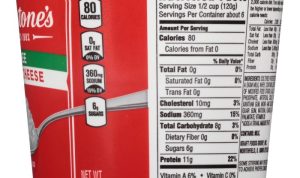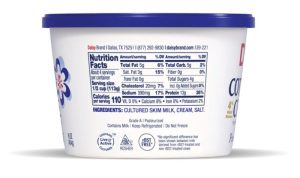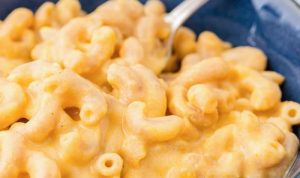Nutritional Composition of Cottage Cheese
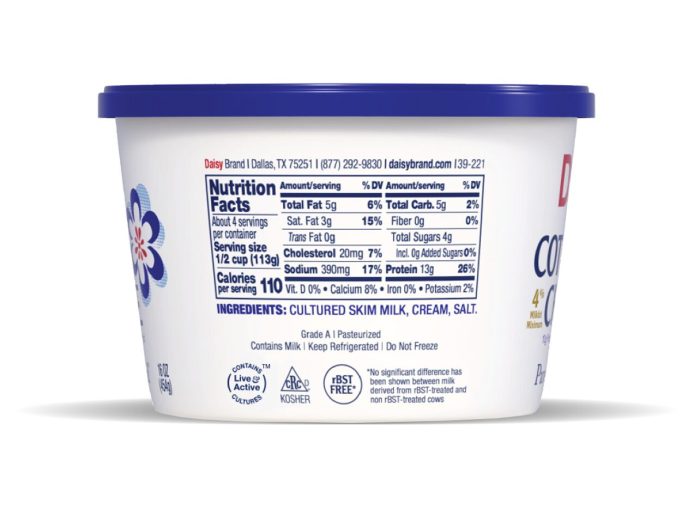
Nutrition facts on cottage cheese – Cottage cheese, a versatile dairy product, offers a unique nutritional profile making it a popular choice for health-conscious individuals. Understanding its macronutrient and micronutrient composition is key to appreciating its place in a balanced diet. This section will delve into the detailed nutritional breakdown of cottage cheese, highlighting variations based on fat content and comparing it to other common dairy products.
Macronutrient Content of Cottage Cheese
The macronutrient profile of cottage cheese varies depending on the fat content. Generally, a typical serving (around 1 cup or 226g) provides a significant amount of protein, a moderate amount of carbohydrates, and varying levels of fat. Low-fat versions minimize fat content while retaining protein and carbohydrate levels, making them suitable for individuals aiming to reduce their fat intake.
Cottage cheese, a protein powerhouse, often feels like a healthier choice compared to other breakfast options. But sometimes, the siren song of a Starbucks Sausage Egg Cheese sandwich is too tempting to resist. To understand the nutritional contrast, check out the detailed breakdown of starbucks sausage egg cheese nutrition and then you can truly appreciate the leaner profile of cottage cheese, a guilt-free way to start your day.
Whole milk cottage cheese, on the other hand, contains considerably more fat, contributing to a richer flavor and higher calorie count. Here’s a general overview:
| Nutrient | Low-Fat Cottage Cheese (1 cup) | Whole Milk Cottage Cheese (1 cup) | Units |
|---|---|---|---|
| Protein | 28g | 25-30g | grams |
| Fat | 2g | 10-12g | grams |
| Carbohydrates | 6g | 6-8g | grams |
Note that these values are approximate and can vary depending on the brand and manufacturing process. Always check the nutrition label on the specific product you are consuming.
Micronutrient Content of Cottage Cheese and Their Health Roles
Beyond macronutrients, cottage cheese is a good source of several essential micronutrients. These nutrients play vital roles in various bodily functions. For instance, cottage cheese is a source of calcium, crucial for strong bones and teeth. It also contains riboflavin (vitamin B2), important for energy metabolism and cell function, and phosphorus, which supports bone health and energy production.
The presence of vitamin B12, essential for nerve function and red blood cell formation, is particularly noteworthy for vegetarians and vegans who may find it challenging to obtain sufficient amounts from other dietary sources.
Comparative Nutritional Profile of Dairy Products, Nutrition facts on cottage cheese
Comparing cottage cheese to other common dairy products helps illustrate its unique nutritional positioning. The table below provides a comparison with yogurt and milk, highlighting key differences in macronutrient and calcium content. Remember that these values are averages and can fluctuate based on the specific product.
| Nutrient | Cottage Cheese (Low-Fat, 1 cup) | Yogurt (Plain, Low-Fat, 1 cup) | Milk (Low-Fat, 1 cup) |
|---|---|---|---|
| Protein (g) | 28 | 15-20 | 8 |
| Fat (g) | 2 | 2-5 | 2 |
| Carbohydrates (g) | 6 | 15-20 | 12 |
| Calcium (mg) | 200-300 | 300-450 | 300 |
Selecting and Storing Cottage Cheese
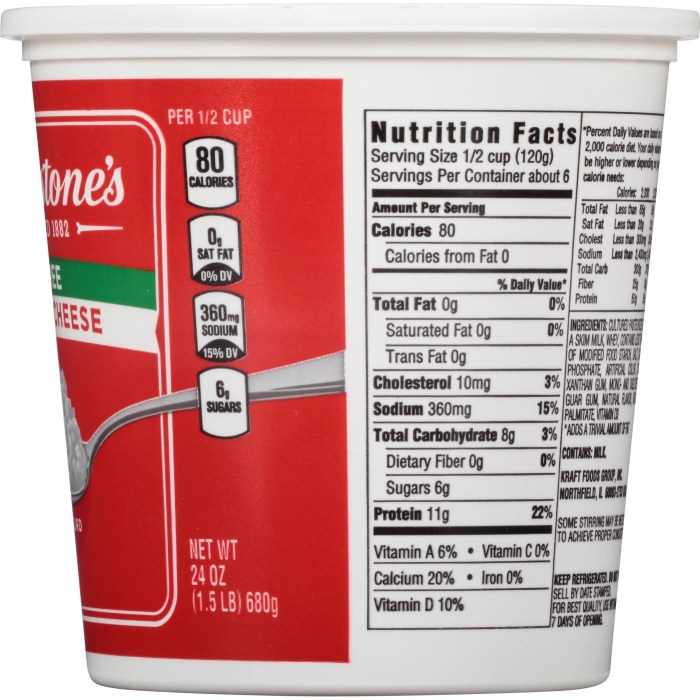
Choosing the right cottage cheese and storing it properly are crucial for maximizing its nutritional benefits and preventing foodborne illnesses. The seemingly simple act of selecting a container from the dairy aisle involves several key considerations, while proper storage ensures you enjoy its creamy texture and fresh flavor for as long as possible.
Several factors influence the quality and nutritional profile of cottage cheese. Understanding these will help you make informed choices at the grocery store.
Factors to Consider When Choosing Cottage Cheese
Fat content is a primary consideration. Low-fat, reduced-fat, and whole milk varieties offer varying levels of fat and calories. Low-fat options are popular for those watching their calorie intake, while whole milk versions provide a richer, creamier texture and slightly higher protein content. Reading the nutrition label allows you to compare fat, protein, and carbohydrate content across different brands and varieties.
Beyond fat content, consider the brand’s reputation for quality and consistency. Some brands may prioritize using higher-quality milk or employing specific production methods that enhance the final product’s taste and texture. Finally, examine the ingredient list. Ideally, cottage cheese should contain primarily milk, cream, and perhaps a touch of salt. Avoid brands with extensive lists of additives or preservatives.
Best Practices for Storing Cottage Cheese
Proper storage significantly impacts the shelf life and quality of cottage cheese. Improper storage can lead to spoilage and potential health risks.
The following guidelines will help you maintain the freshness and nutritional value of your cottage cheese:
- Refrigerate immediately after purchase: Cottage cheese should always be kept refrigerated at or below 40°F (4°C). Leaving it at room temperature even for a short time can promote bacterial growth.
- Store in its original container: The original container is usually designed to maintain freshness and prevent contamination. Transferring it to another container might expose it to unwanted elements.
- Use within the “sell-by” date: While cottage cheese might remain safe for a few days beyond the sell-by date if properly stored, it’s best to consume it before this date for optimal quality and taste.
- Check for signs of spoilage: Before consuming, examine the cottage cheese for any unusual changes in smell, texture, or color. A sour odor, slimy texture, or off-color is a clear indication of spoilage.
Risks Associated with Consuming Spoiled Cottage Cheese
Consuming spoiled or improperly stored cottage cheese can lead to several health risks. Bacteria such as Listeria monocytogenes, Salmonella, and E. coli can thrive in improperly stored dairy products. These bacteria can cause various illnesses, ranging from mild digestive upset to more serious conditions requiring medical attention. Symptoms of foodborne illness can include nausea, vomiting, diarrhea, abdominal cramps, and fever.
In severe cases, these infections can lead to hospitalization or even death, particularly in vulnerable populations like pregnant women, young children, and the elderly. Therefore, paying close attention to storage guidelines and discarding any cottage cheese showing signs of spoilage is crucial for preventing foodborne illness.
Essential FAQs: Nutrition Facts On Cottage Cheese
Is cottage cheese good for weight loss?
Yes, cottage cheese is often recommended for weight loss due to its high protein content, which promotes satiety and helps manage hunger. Its relatively low calorie count per serving also contributes to its suitability for weight-management diets.
Does cottage cheese contain lactose?
Yes, cottage cheese does contain lactose, although the amount varies depending on the brand and manufacturing process. Individuals with lactose intolerance may experience varying levels of digestive discomfort. Look for lactose-free options if needed.
How long can I store cottage cheese?
Store cottage cheese in an airtight container in the refrigerator. It typically lasts for 7-10 days after the sell-by date, provided it is stored properly and hasn’t developed an off-putting odor or texture.
Can I freeze cottage cheese?
While freezing cottage cheese is possible, it can alter its texture, making it somewhat grainy upon thawing. It’s best to consume it fresh.


